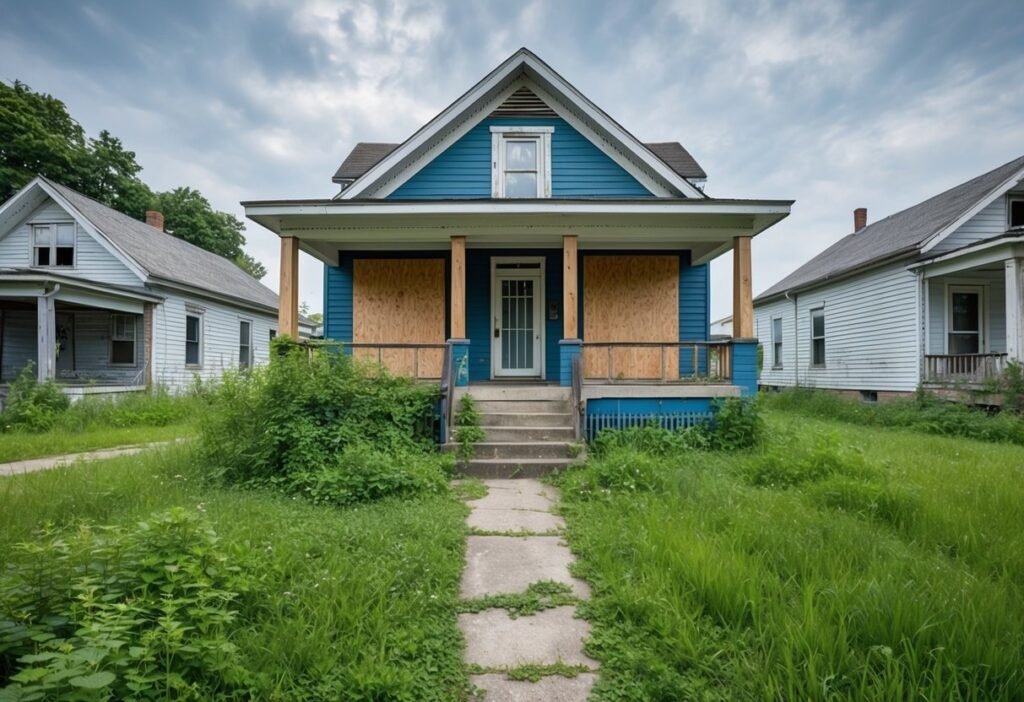If you’re considering jumping into foreclosure investing, you need to be aware that the process is riskier than many people realize. Understanding the most common foreclosure investing risks can help you avoid expensive mistakes and protect your investment. While the appeal of acquiring property below market value is strong, there are several pitfalls that can catch unprepared buyers off guard.
From potential issues like buying a property in poor condition to the possibility of legal complications and stiff competition at foreclosure auctions, you’ll need to do your homework before making a move. Knowing what to look for, and where the real dangers lie, can give you a critical advantage and help you make more confident decisions that safeguard your finances.
Key Takeaways
- Foreclosure investing involves unique and sometimes hidden title risks.
- Proper research and due diligence are key to minimizing losses.
- Entering the market prepared helps you avoid common beginner mistakes.
Key Risks of Foreclosure Investing
Foreclosure investing can create opportunities, but several risks can jeopardize your return or lead to unexpected expenses. Legal issues, property conditions, and financing problems are especially common and can be costly if not addressed early.
Legal and Compliance Concerns
Dealing with foreclosures means navigating property laws, title issues, and local compliance requirements. In some states, there could be redemption periods, giving the previous owner the right to reclaim the property even after you think you own it. Buying at auction can complicate these issues since title searches sometimes miss liens or unpaid taxes.
Missed legal requirements can expose you to lawsuits or unexpected costs. For example, if there are tenants in the property, you may have to follow strict eviction processes or comply with tenant protection laws. It’s important to review the chain of title and ensure all documents are in order before closing. Many investors consult a real estate attorney to minimize these risks. You can learn more about legal pitfalls in this resource on risky foreclosure purchases.
Hidden Repair and Rehabbing Costs
Foreclosed homes often come in as-is condition. Properties are sometimes vacant for months or left in disrepair by former owners. Typical issues include water damage, structural problems, outdated electrical or plumbing, and neglected maintenance. Inspections aren’t always possible before purchase, especially at auction, so you may discover problems after acquiring the property.
Prepare for costs like:
- Roof replacement
- Mold remediation
- Pest control
- Code violations
- Major appliance replacements
Budgeting a standard percentage for repairs is risky. Unexpected defects can derail your project’s accounting and timelines, particularly if city inspections reveal new code compliance issues. The risks and potential repairs involved in distressed and foreclosed homes are outlined in this guide to investing in distressed properties.
Financing Challenges and Mortgage Rates
Getting a traditional mortgage for a foreclosed property may be difficult. Many lenders have strict requirements for property condition, which foreclosures often fail to meet. Higher down payments, additional inspections, or private loans might be necessary when a home is in poor shape.
Mortgage rates for distressed or foreclosed properties can also be higher if the property is classified as risky inventory. This means your borrowing costs could increase, and loan terms may be less favorable. Short timelines for closing, especially at auction, may require cash or hard money loans at elevated rates.
Market Impact and Due Diligence in Foreclosure Investing
Foreclosure investing involves unique market risks, title and ownership legalities, and property conditions that can jeopardize your potential returns. Being aware of these risks and addressing them through due diligence is essential to minimizing costly mistakes when investing in foreclosed homes.
Fluctuating Market Value and Resale Risk
Home values in the foreclosure market may not always reflect the broader real estate trends. Rapid shifts in the housing market, such as declining prices or sudden oversupply, can drastically affect your ability to resell a foreclosed property at a profit. Properties purchased at foreclosure sales are often priced below market value, but this does not guarantee a favorable resale margin.
If you buy in a declining market, your investment property may remain unsold for months or require price cuts. Market saturation with real estate owned properties (REO) or other distressed listings can further drive down prices, eroding your gains. To reduce this risk, analyze recent comparable sales, monitor the foreclosure market, and consider factors that influence short sale and REO demand. Anticipate that resale timelines may be unpredictable, and factor in holding costs when calculating expected returns.
Title and Ownership Issues
Foreclosed homes frequently come with complicated title and ownership histories. Unpaid property taxes, unresolved liens, or claims from previous owners can delay or derail your investment. Buying a foreclosed home without confirming clear title exposes you to legal and financial disputes.
Work with a reputable title company to conduct a thorough title search before closing. Review the property’s public records for tax delinquencies, judgment liens, and outstanding mortgages. Be cautious with auction sales, which often sell “as-is” with limited title guarantees. In some cases, claims may remain even after a transfer, especially if prior owners pursue legal action. Protect yourself by understanding the risks and ensuring you obtain title insurance during the transaction.
Importance of Thorough Home Inspection
Foreclosure and real estate owned properties often require major repairs due to neglect, vandalism, or unauthorized occupants. Many investment properties are sold “as-is,” leaving you responsible for all defects. Skipping a professional inspection can lead to unexpected repair costs that substantially reduce profitability.
Arrange a detailed home inspection to assess roof condition, electrical and plumbing systems, structural integrity, and any safety hazards. Some properties may have hidden damage like mold, water intrusion, or broken utilities that increase renovation costs. Where possible, use your inspection findings to negotiate repairs or a lower purchase price. Failing to inspect thoroughly can turn a promising foreclosure investment into a costly mistake.
Frequently Asked Questions
Investing in foreclosed properties involves risks related to property condition, legal complications, and unplanned expenses. Understanding these issues and the steps required to minimize them can help you make informed decisions.
What are the common pitfalls to avoid when investing in foreclosed properties?
Many investors face problems with hidden damage, unpaid liens, or tenants who refuse to leave. Often, properties are sold “as-is,” and you may not get a full disclosure about their condition or history. Some common pitfalls include maintenance issues, legal entanglements, and unexpected repair costs.
What due diligence is required before bidding on a property at a foreclosure auction?
You should research the property’s title, check for outstanding liens, and evaluate the physical condition before bidding. Inspect tax records, verify the ownership history, and attempt to view the interior if possible. It’s essential to read auction rules thoroughly since auction sales are usually final and sold as-is.
How can unexpected costs impact the profitability of foreclosure investments?
Unexpected repair expenses, unpaid property taxes, and outstanding utility bills can significantly reduce your return on investment. Foreclosed homes often need extensive work due to neglect or vandalism. Investors are sometimes surprised by repair and maintenance needs that exceed initial estimates, affecting profits.
Is it advisable to purchase a foreclosed home as a first-time buyer?
Buying a foreclosed property as a first-time buyer can be risky due to the complexity of the process and the potential for hidden issues. Without experience, you may overlook major problems or underestimate repair costs. Those new to real estate should consider working with a knowledgeable agent or avoid foreclosures until they gain more experience.
What are the legal considerations to be aware of when investing in foreclosed homes?
You need to check for any unresolved liens, judgments, or back taxes attached to the property. Understanding state and local foreclosure laws is crucial, as these affect timelines, rights of redemption, and the eviction process. It’s often recommended to consult a real estate attorney to avoid legal complications when buying foreclosures.
How does the foreclosure investing process differ in different states, such as California?
Foreclosure laws and procedures vary from state to state. For example, in California, most foreclosures are nonjudicial, meaning the process is usually faster but offers fewer protections for buyers and owners. Some states require court approval, while others handle foreclosures through public auctions or trustees. Always review your state’s specific foreclosure laws and rules before investing.
Looking for deeply discounted properties others don’t know about?
Don’t miss out on the next great investment opportunity! Search millions of foreclosure listings and get daily alerts for new properties in your target market.

Are you a contrarian investor with the foresight to spot opportunities where others see only chaos?
Rental Property Management in a Market Crash is your essential guide to navigating turbulent economic waters. Learn how to capitalize on market downturns that inevitably occur, drawing parallels between the Global Financial Crisis of 2007-09 and current market conditions.
This book offers invaluable insights into the dynamics of the housing market during a downturn, equipping you with the knowledge to make informed decisions and build a resilient investment portfolio.
Don’t just weather the storm – learn to thrive in it. Get your copy now from your favorite bookseller:
- Amazon as an ebook
- Books2Read for Apple, Barnes & Noble, Kobo, Scribed, and 8 more sellers with both eBook and paperback options available
- Payhip as a downloadable PDF






